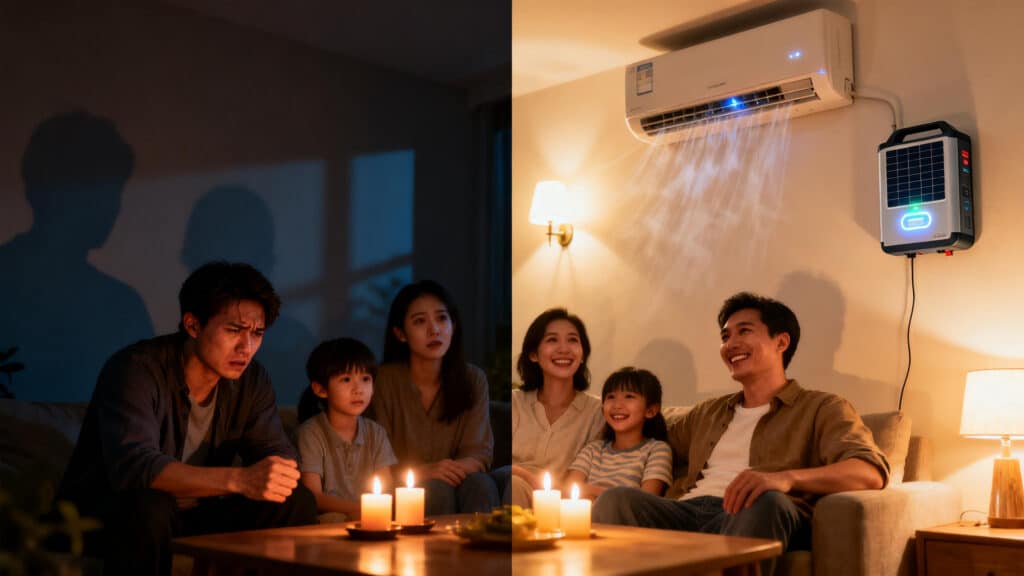Key Takeaways for Solar Professionals
- Supplier Vetting is Crucial: The long-term cost of a cheap, unreliable battery far outweighs initial savings. Focus on suppliers with transparent supply chains and robust quality control.
- Look Beyond the Spec Sheet: Real-world performance, especially cycle life at high ambient temperatures, is a more critical metric than nominal capacity.
- Warranty Defines the Partnership: A strong warranty with clear terms and accessible after-sales support is a non-negotiable indicator of a manufacturer’s confidence in their product.
- Certifications are the Baseline: Verifiable TUV, CE, and ISO certifications are the minimum requirement for ensuring safety, quality, and manufacturing consistency.
For solar distributors and project contractors, sourcing a reliable solar battery for unstable grid applications is your business’s backbone. Your reputation depends on it. Yet, the market is flooded with suppliers promising high performance, only to deliver products that degrade quickly in real-world conditions, leading to costly service calls and eroded partner trust. This guide moves beyond marketing claims and provides a concrete vetting framework for identifying a truly bankable energy storage partner. We will break down the critical technical, logistical, and financial checks you must perform to secure a product that protects your margins and your customers.
Table of Contents
ToggleWhat is the Best Battery for Frequent Power Outages?
The challenge for distributors targeting regions with unreliable power grids is that not all batteries are created equal. The primary reason many off-grid solar battery solutions fail prematurely is a mismatch between the product’s datasheet and its real-world operating environment. Factors like high ambient temperatures drastically accelerate battery degradation, a detail often obscured in marketing materials. This leads to major pain points like managing extensive after-sales support tickets and dealing with the financial fallout of warranty claims. True reliability requires a deep dive into the manufacturer’s quality control, cell sourcing, and the sophistication of their Battery Management System (BMS), which is critical for preventing issues like thermal runaway.

The 3-Pillar Framework for Vetting Solar Battery Suppliers
To mitigate risk, adopt a systematic approach to supplier evaluation. This framework focuses on verifiable proof of quality, operational stability, and long-term partnership value.
Verifying Tier 1 Status and Quality Certifications (TUV, CE)
A manufacturer’s claims are meaningless without third-party validation. Insist on viewing high-resolution copies of their TUV certification and CE mark compliance documents. These shouldn’t just be logos on a website. Ask for the certification numbers and verify them. This is your first line of defense, ensuring the product meets fundamental safety and performance standards. You can review our certifications here: [Link to Xiensolar’s Certifications Page].
Auditing Supply Chain Stability & Factory Capacity
Consistent delivery is as important as product quality. Investigate the manufacturer’s supply chain resilience. Do they manufacture in-house or assemble third-party components? An integrated manufacturer has greater control over quality and lead times. Request a virtual or, if possible, in-person factory audit. This provides transparency into their production capacity and quality assurance processes, proving they can handle your volume without compromising standards.
A Deep Dive into Warranty Terms & After-Sales Support
The warranty is the most honest part of a datasheet. Scrutinize the warranty terms. Is it a simple replacement policy, or does it cover shipping and labor costs? What is the process for making a claim? A strong manufacturer will have a dedicated, technically proficient after-sales support team for its partners. According to Xiensolar’s internal lab data, our batteries retain over 80% capacity after 6,000 cycles at a 90% Depth of Discharge (DoD), which is why we offer an industry-leading 15-year performance warranty.
Showcasing Trust - How Xiensolar Ensures Partner Success
Our entire manufacturing philosophy is built to deliver a superior solar battery for unstable grid environments. By integrating cell production, BMS development, and assembly under one roof, we provide partners with unparalleled energy storage for unreliable power needs. This vertical integration is our promise of quality and supply chain stability. But don’t just take our word for it.
“We switched to Xiensolar two years ago after constant failures with another supplier. Their battery reliability in high-heat environments has cut our after-sales service costs by over 30%. Their logistics support for our projects in East Africa has been a game-changer.”
– John Okoro, CEO, African Solar Integrators
Frequently Asked Questions
How does high temperature affect solar battery cycle life?
High temperatures accelerate the chemical reactions inside a lithium-ion cell, leading to faster degradation of the electrolyte and cathode materials. This reduces the battery's ability to hold a charge over time. A quality battery uses superior thermal management within its BMS and cells with higher chemical stability to mitigate this effect, a key factor in our designs.
What's more important for off-grid reliability: lithium or lead-acid?
For off-grid reliability, Lithium Iron Phosphate (LiFePO_4) batteries are superior to lead-acid. They offer a much higher cycle life (5000+ cycles vs. 500-1000), a greater Depth of Discharge (80-100% vs. 50%), higher efficiency, and are maintenance-free. While the upfront cost is higher, the total cost of ownership is significantly lower.
How can I verify a supplier's factory and supply chain claims?
The best way is through a factory audit. If an in-person visit isn't feasible, request a live, detailed video tour of their production lines. Ask for documentation on their raw material sourcing and quality control checkpoints. Reputable suppliers will be transparent.
Conclusion
Choosing the right solar battery for unstable grid applications is a strategic decision that directly impacts your long-term success. By moving beyond simple spec sheets and implementing a rigorous vetting framework focused on certifications, supply chain resilience, and comprehensive warranty support, you can build partnerships that deliver true value and reliability to your end-customers.






